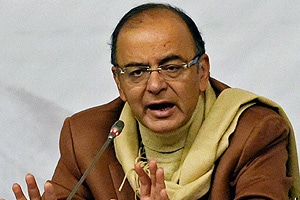The government on Friday tabled in the Lok Sabha a Bill to amend the Constitution for laying the framework for a goods and services tax (GST) that would replace most of the central and state levies from April 2016 and create a single national market. Introducing the Bill, finance minister Arun Jaitley said, “We have made sure that no state will lose a rupee of revenue. It will be a win-win situation.”
Jaitley told reporters that the Bill seeks to create a “perfect architecture” for GST by not excluding petroleum products through a constitutional provision while at the same time providing “a comfort to states” that till a constitutionally empowered GST council decides to bring petroleum products in, they will remain out. As reported by FE, the Centre will levy excise duty and states charge VAT or sales tax on petroleum products till these items are brought under GST.
“The council will decide when to notify the provisions regarding levying GST on petroleum products in three separate laws to be made after the Constitution is amended,” explained a finance ministry official.
The Constitution (122nd Amendment) Bill that primarily seeks to allow the Centre to tax the sale of goods at all stages beyond the factory gate and states to tax services provides for setting up a powerful ministerial panel called the GST council, will decide on all operational aspects of the new indirect tax regime.
“Accommodating states’ concerns, the present Bill provides for including petroleum in GST through the constitutional amendment, but the date on which petroleum can be taxed under GST will be decided by the GST council,” said the minister.
He added that the Centre will have one-third representation in the Council, while states have two-thirds. All decisions require 75% majority.
“The majority of states alone, or the Centre alone, cannot push a decision, but the two collectively can,” said Jaitley, adding that this principle applies on every decision related to GST’s fine print. No one can take that decision arbitrarily, said the minister.
The Bill also provides for manufacturing states to levy 1% tax on interstate sale of goods to compensate for any revenue loss in the new regime, where proceeds of Integrated GST on cross-border trade will go the consuming state against the current practice of its equivalent — central sales tax — going to the exporting state. This extra 1% tax will exist only for two years.
The Bill also provides for a constitutional guarantee for compensating states for any revenue loss under GST for five years. For three years, states would be compensated fully for any revenue loss, 75% in the fourth year and 50% in the fifth year. He also said states would be compensated for revenue loss on central sale tax and the first instalment would be made before March 31 next year through a supplementary demand for grants. “I do not intend to pass it (GST Bill) in the current Parliament session. We will formally take it up in the next session,” Jaitley said.
The minister described the move as the biggest tax reform since independence, which is expected to add to the economic growth rate as well as to the revenue buoyancy of central and state governments. Chief economic adviser in the finance ministry Arvind Subramanian called it a step in the direction of internal trade liberalisation.
